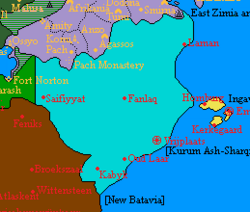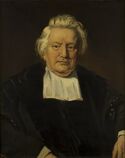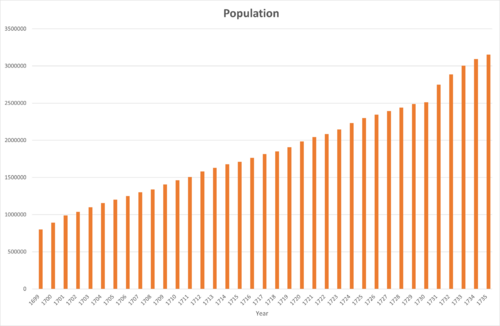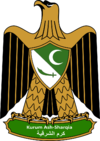Kurum Ash-Sharqia
| Sultanate of Kurum Ash-Sharqia | |||
| |||
| Motto: Is not Allah sufficient for His Servant? | |||
| Anthem: | |||

| |||
| Map versions | 17.4.3 - present | ||
| Capital | Vrijplaats | ||
| Official language(s) | English, Dutch | ||
| Official religion(s) | Islam | ||
| Demonym | Kurum Ash-Sharqian | ||
| - Adjective | Kurum Ash-Sharqian | ||
| Government | Constitutional monarchy | ||
| - Sultan | Saif Ad-Din I | ||
| - Grand Vizier | Maryam bint Bashir Khan | ||
| - Legislature | Al-Majlis Al-Watani | ||
| Establishment | 1699 AN | ||
| Area | |||
| Population | 2,500,000 | ||
| Currency | dinar | ||
| Calendar | Anno Nortone (revised) | ||
| Time zone(s) | |||
| Mains electricity | |||
| Driving side | |||
| Track gauge | |||
| National website | Wikiportal | ||
| National forum | |||
| National animal | |||
| National food | |||
| National drink | |||
| National tree | |||
| Abbreviation | KS - KUR | ||
The Sultanate of Kurum Ash-Sharqia is a nation located in eastern Corum. It was formed when two governorates of New Batavia peacefully seceded in 1699 AN, mainly over linguistic issues.
History
- See also: Timeline of Kurum Ash-Sharqia

After the restoration of the Islamic Internet Republic in 1689 AN, large numbers of exiles who had fallen into diaspora, returned to Southern Corum. Many of them were of mixed families through intermarriage, mainly with Batavian and Mercurian families. These mixed families often had other languages than Dutch as their first language, mainly English. The anglophone community felt neglected by the Lucerne based government. The South Corum Independence Party became the voice of this group in 1692 AN. In 1696 AN descendants of former IIR-citizens in The Green united themselves and organized several Marches on Broekszaal. They demanded citizenship rights and expansion. A substantial expansion claim by New Batavia was accepted and several new governorates founded, but linguistic issues remained. In 1698 AN the governorates of Al-Ard Al-Moestasliha and Dar Al-Hoeriya voted to secede from New Batavia and the Sultanate of Kurum Ash-Sharqia was created.
In 1700 AN Salah Ad-Din Al-Lusirni ascended the throne as the nation's first sultan. He appointed Faisal Van Looveren, who headed the provisional government, to the office of Grand Vizier.
Faisal Van Looveren's cabinet stressed reconciliation with New Batavia after the secession, and negotiated an extensive free trade agreement in 1703 AN. There were also friendship treaties with Hurmu, Sanama and the Çakar Empire.
In 1730 AN Sultan Salah Ad-Din passed away, after thirty years on the throne. He was succeeded by his son and Crown Prince Saif Ad-Din. The old Sultan left a stable constitutional monarchy and viable dynasty.
In 1731 AN, the MCS approved a substantial land claim, extending Kurum Ash-Sharqia to the 100th meridian. This decision followed meticulous preparation by the Surveying and Expansion Commission. However, the costs associated with developing the new territories placed a significant strain on the state budget, resulting in heightened inflation and sluggish economic growth. These financial difficulties were further intensified by the global recession of 1737.
Government
- See also: Constitution of Kurum Ash-Sharqia
Kurum Ash-Sharqia is a constitutional monarchy headed by the Sultan.
The Sultan ceremonially appoints the Grand Vizier with the approval of Al-Majlis Al-Watani. The Grand Vizier, then, appoints the other members of the cabinet. The cabinet needs the confidence of Al-Majlis Al-Watani.
Legislative power is vested in Al-Majlis Al-Watani (National Assembly). The 100 seats in this assembly are distributed proportionally after elections every 4 years.
Before a law is passed, it needs the advice of the Islamic Diwan, although this advice is non-binding. At least half of the ordinary members need to be Muslim. The Islamic Diwan is the so-called advisory branch of government. The Diwan is the only Islamic institution of the Sultanate. All other institutions are secular in nature.
Judiciary power resides with independent courts: the Supreme Court and lower courts. Judges are appointed for life to ensure their independence.
Local government is administrated by 7 governorates.
Population
In the two years following Kurum Ash-Sharqia's independece, there was a population increase of 11 % due to the immigration of English speaking citizens from New Batavia. The years after that, population growth was stable around 3 % to 5 % due to a relatively high birth rate and immigration. According to some politicians, this population increase didn't lead to the necessary economic growth. This in turn led to the formation of the Surveying and Expansion Commission in 1726 AN.

Education
Kurum Ash-Sharqia has three universities. After 1731 expansion, two new universities were established.
- Theological University of Oud Laar, established in 1723 AN
- University of Dar Al-Hikma, established in 1734 AN
- Laman Institute of Technology, established in 1736 AN
Trivia
Kurum Ash-Sharqia received the 2021 Fnord Award for Best New Country for "being the best new country that is not a resurrection – with an interesting and well-developed backstory and an active presence in the diplomatic world".
| |||||||||||||||||||||||||||||||||||||||||


